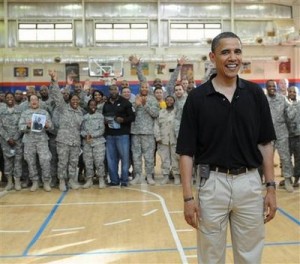On Wednesday night, in an interview with Larry King, the author of what is surely one of the biggest pieces Rolling Stone has ever published revealed his true intentions behind the research and publication of his article.
King asked Michael Hastings, “Is there a part of you that feels bad for the General?” Hastings responded, after giving a bit of praise to McChrystal as an “impressive individual”, by saying “I think the problem becomes, in my view, is when guys like General McChrystal, who spent the last nine years fighting these wars… I think when war becomes your life, I think it’s very difficult to have the proper perspective to be able to create a fully balanced policy. And I think that’s what’s happened here: the policy between the military side of Afghanistan and the diplomatic side is totally out of whack and General McChrystal controlled both of them.”
So Hastings, when asked if he felt any remorse or any negative feelings at all about the fate of the General, responded by making a clear admission that the policy that he personally feels should be executed in Afghanistan was not the same policy that was being pursued by the General.
In his speech on Wednesday, President Obama cited as a main reason for his dismissal of McChrystal — I mean his “acceptance of General McChrystal’s resignation” — was a lack of “strict adherence to the chain of command and a respect for the civilian control over that chain of command.” But if you read the Rolling Stone article, General McChrystal said nothing about the Commander-in-Chief (but staffers did give praise to Hilary Clinton). The person in the administration that was insulted the most was Vice President Biden, who actually doesn’t rank anywhere in the chain of command. Hastings had to get his dirt from lower-level staff who did, in fact, have harsh words of those who are in the chain of command. When Larry King pointed out that the article was mostly of the General’s staff, Hastings immediately went on the defensive saying, “I think General McChrystal’s voice is heard throughout, at the appropriate times…the staff quotes…are a very good reflection of General McChrystal’s thinking…”
The argument that the feelings expressed by the staff was a reflection of an atmosphere fostered by General McChrystal without question has merit. That argument, however, does not negate the fact that McChrystal showed his respect for the President and chain of command when dealing with reporters.

One thing is for sure, future journalists that wish to be embedded with our troops are going to be affected by this article and they have Hastings to blame. Hastings has set the dangerous precedent that journalists can be on the offensive to remove military personnel who don’t execute the policy the journalists personally feel should be in place in Afghanistan and be effective. The military is bound to restrict access, and rightly so. As a commander, how can you put the lives and careers of your troops in the hands of what could be an activist journalist?
Not surprisingly, the MSM is on the same page with Hastings. It looks like someone has been distributing talking points again.
Without question there are outside forces that affect the perception of this decision, the appointment of Petraeus, the comments made by the staffers, McChrystal’s controversial rules of engagement, and McChrystal’s poor judgment in letting this journalist have this type of access to his inner circle. However, these outside forces don’t negate the fact that Hastings, with an absolute agenda against a specific military commander’s policy, embedded with this officer’s inner circle and wrote a piece that effectively ended that officer’s military career which will likely result in a change of policy with which this journalist personally disagreed. In a later interview, Hastings’ comments give a pretty good argument that at worse, it was intended to affect the military policy that he personally didn’t agree with and at best, it was a happy accident. That is significant. It will affect future war journalists and how the military responds to them.
COMMENTS
Please let us know if you're having issues with commenting.